At MPC, everything we do is made possible thanks to the generosity of our donors. Our community of partners is wide, varied, and humbling. This year's Annual Luncheon, held on September 19th with support from longtime Presenting Sponsor PNC Bank, reminded us how grateful we are for the people and organizations who lend your time and treasure to making Chicagoland better and bolder.
View our 2019 impact video: Making Positive Change
At the event, MPC President MarySue Barrett welcomed 800 guests and shared several stories of individuals who inspire the Council’s bold agenda for change. People like Lissette Castañeda, who's been fighting in Logan Square since her teens to secure affordable housing for everyone, especially people of color, grounded in an unshakable belief that housing is not a privilege, but a right. People like Michele Lee, a power chair user whose creative advocacy on social and traditional media is making our transit network more accessible for all.
And Barrett’s closing remarks were a passionate plea:
“Since 1934, we’ve been a spark, moving Chicago from what is to what could be. We need each of you to kindle that spark, creating collaborations where our boldest ideas can flourish. Because we believe every neighborhood has promise, every community should be heard, and every person can thrive. Join us in Making Positive Change.”
MPC also recognized representatives from Austin Coming Together, a community collaboration in Chicago’s Austin neighborhood and this year’s recipient for the Burnham Award for Excellence in Planning. Thanks to input from over 400 Austin residents, Austin Coming Together has attracted over $2.6 million in investments since last year, opened a new community center, and launched a community-wide youth council.
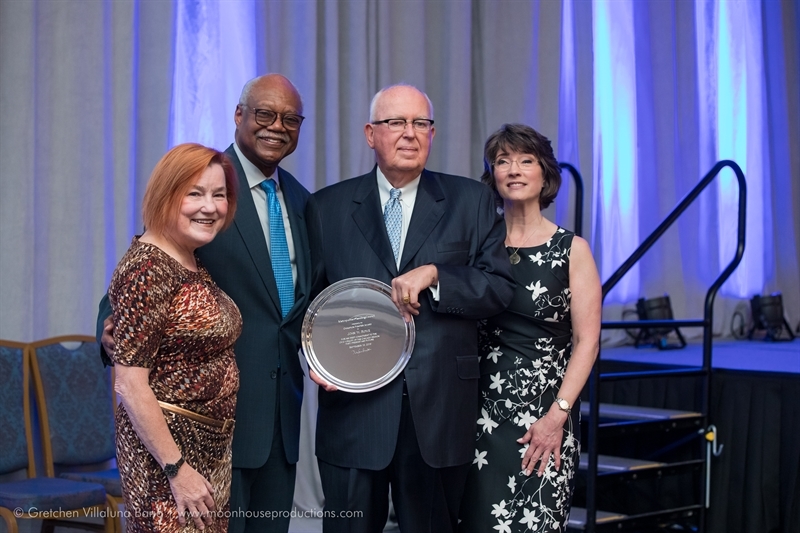
From left: Ellen Carnahan, Frank Clark, John Rowe, and MarySue Barrett
MPC’s 2019 Champion Fighter Award went to widely respected business executive and philanthropist John Rowe, Chairman Emeritus of Exelon Corporation. Frank Clark, retired Chairman and CEO at ComEd and close friend of Rowe, presented the award with a few anecdotes and these kind words:
“I don’t know anyone who’s been a champion for more individuals that John Rowe.”
With conviction born of personal experience as a volunteer assisting students at Rowe-Clark Math and Science Academy, Rowe issued an urgent call to action to the over 800 business, civic, and community leaders in the room, musing that “we’ve met the enemy and he is all of us.” His specific ask was this:
“Whatever our age or calling, we have to recommit ourselves to taking input as well as imparting knowledge. Most of all, we have to know people who don’t look quite like us.”
MPC Board Chair Ellen Carnahan reflected on how far MPC and the region have come - and how much more work there is to do to deliver equitable growth that works for everyone. Introducing keynote speaker Raj Chetty, founder of Opportunity Insights, Carnahan quoted a colleague who said “‘The question with Raj is not if he will win a Nobel Prize, but when.’ ” She referenced the weight and relevance of Chetty’s work in metropolitan Chicago, and welcomed Chetty to the stage by reflecting that “in a segregated region like Chicagoland, his work on the power of mobility and place resonates deeply.”
View remarks by Annual Luncheon Champion Fighter John Rowe
View a video of Raj Chetty's presentation
View Raj Chetty's presentation slideshow
Harvard Professor, MacArthur Fellow, and Founder of Opportunity Insights Raj Chetty began his presentation like a seasoned professor teaching a class of eager first-years: with an immediate deep-dive that could be called “Contemporary American Economics 101: The Fading American Dream.”
On the fading American Dream
Chetty’s slides kicked off with a striking visual representation of the classic “American Dream”- one of earning more than your parents- becoming out of reach.
“...for children born in the 1980’s it’s now a 50-50 shot whether you’re going to do better than your parents.”
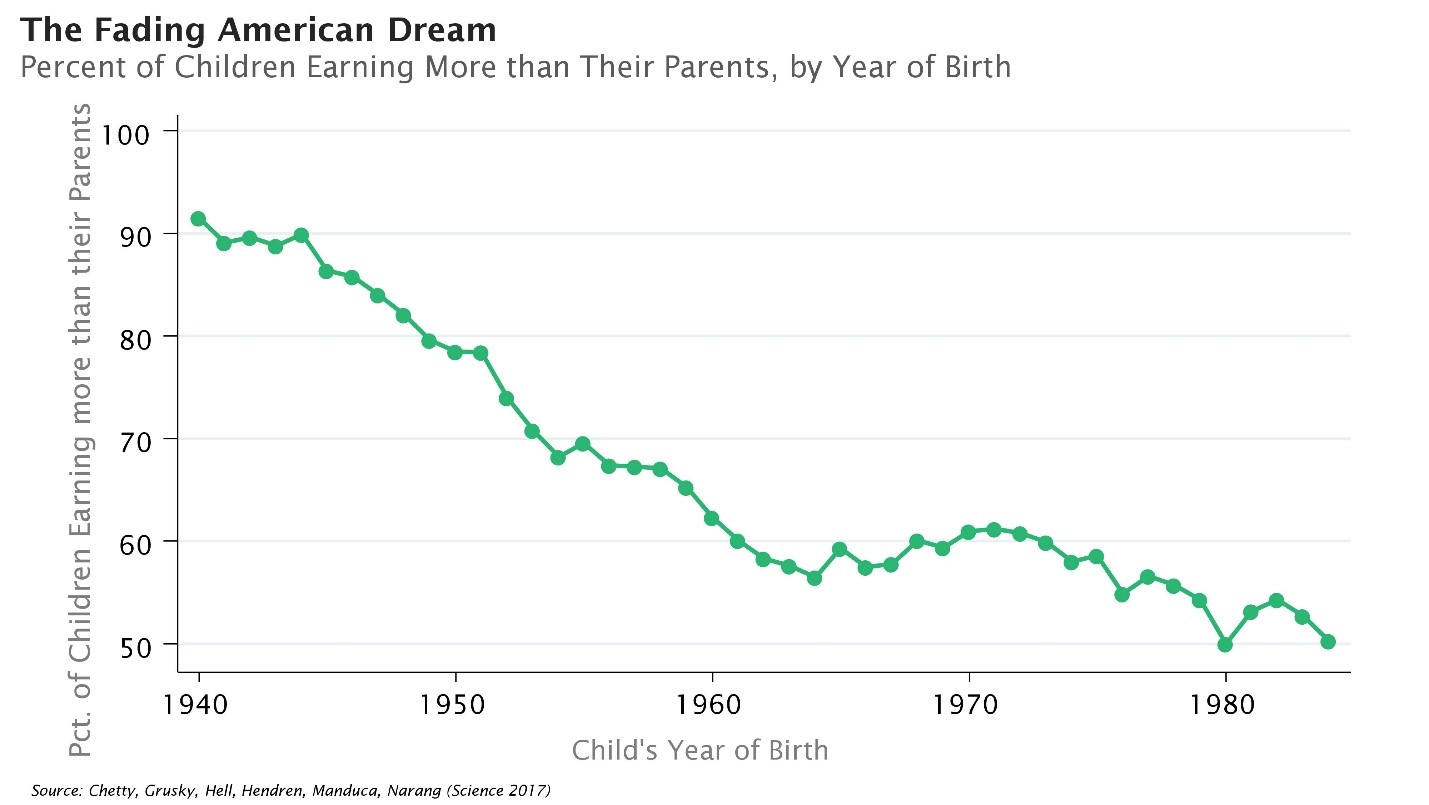
On upward mobility vs. job growth
Chetty proceeded to explain the historical lack of correlation between increased job growth and achieving the American Dream.
“Having more jobs in your area is not in and of itself a guarantee that you’re going to have higher rates of upward mobility for your local population. Put differently, getting the Amazon headquarters to come to your city might be useful for various reasons but it’s not an automatic guarantee that your local population, particularly low and middle income kids, are going to benefit.”
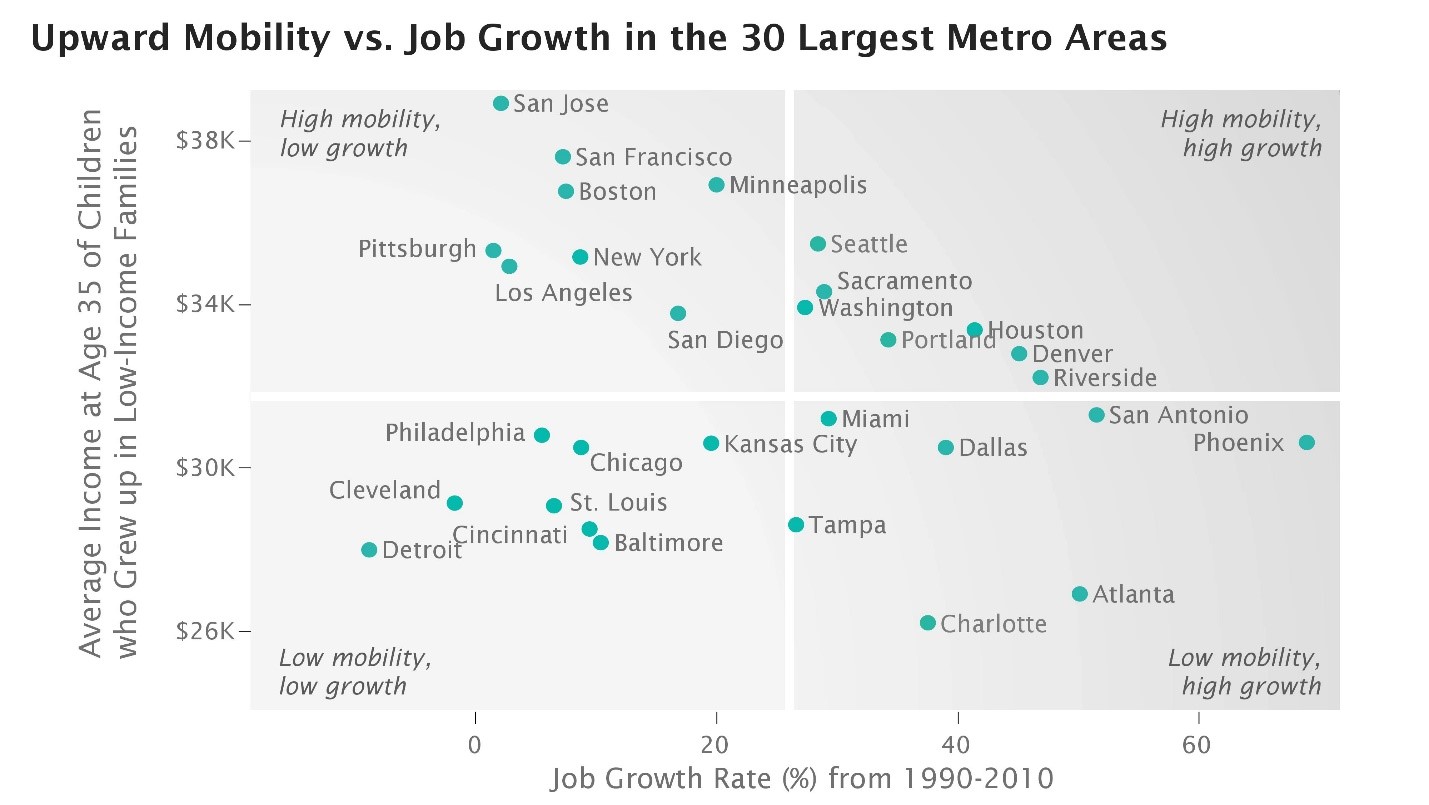
On racial inequity across the United States
Chetty mapped out areas where social mobility is highest and lowest across all 50 states, noting that people familiar with American demography would recognize that the areas with lowest rates of social mobility tend to be places with higher concentrations of minority populations, particularly Black populations, and often in the south. He displayed two maps side by side, one showing social mobility for white men, and one showing social mobility for Black men.
“It’s essentially like there are two Americas. The distribution in terms of economic opportunities, for Black men, is completely non-overlapping with that for white men.”
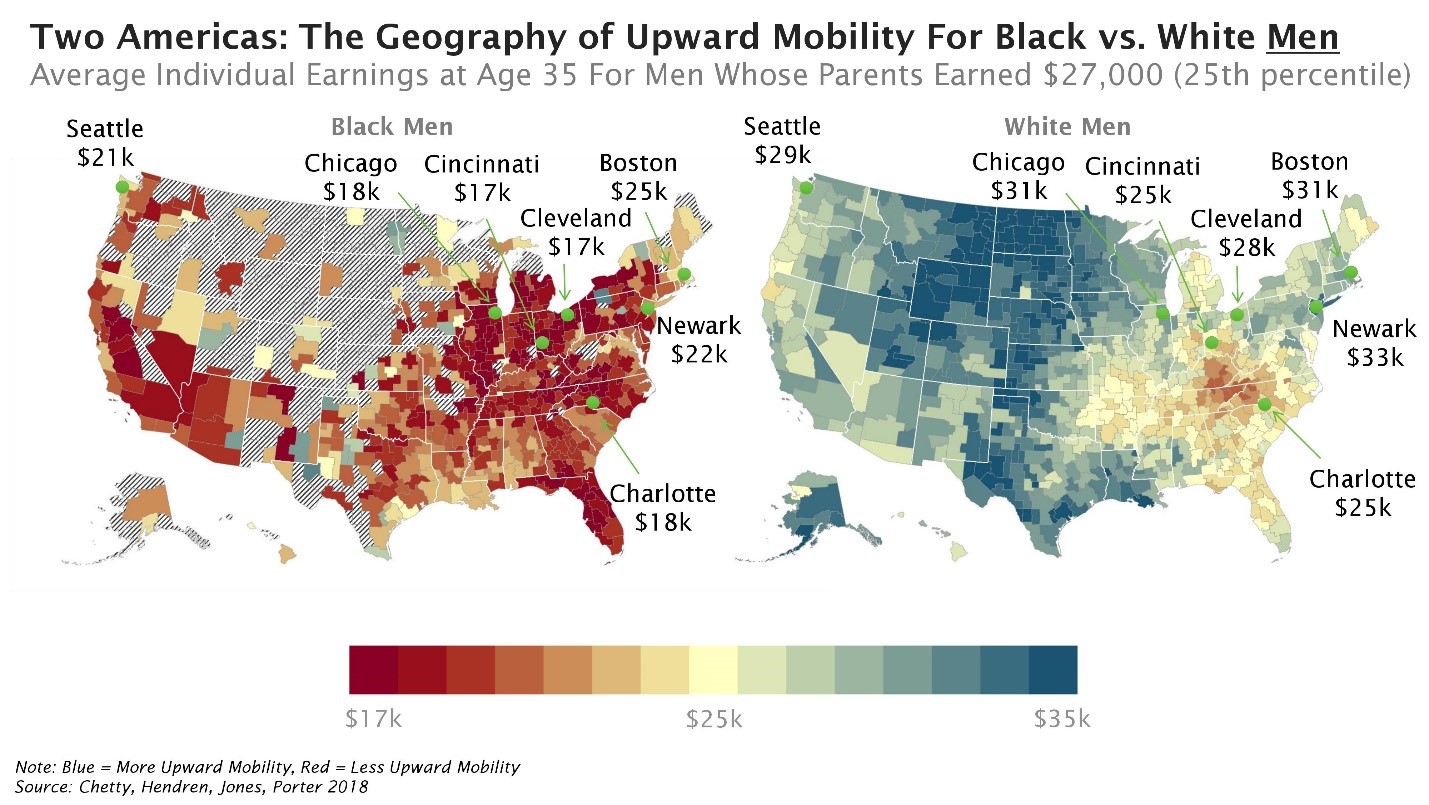
On racial inequity in Chicago
After showing maps of high and low upward social mobility across the nation that presented extreme racial disparities, Dr. Chetty zeroed in on Chicago.
“If you look at the gap in terms of rates of upward mobility between white men and Black men, Chicago ranks 50th out of the 50th largest cities in America, in terms of racial disparities and upward mobility. It’s a striking problem, particularly in Chicago.”
In a follow-up interview with WBEZ, Chetty added some extra context to paint a slightly more hopeful picture, explaining that “Chicago is interesting because I think most people view it as an incredibly dynamic city that’s doing very well. ... And for white families, in particular, that is the case. But Chicago, despite its prosperity, is apparently also leaving a large group of people behind, confined to certain neighborhoods. I think it’s those types of places that really have an opportunity.”
Chetty pointed out that social mobility overlaps with closer similarity between Black and white women, meaning that gender is a differentiating factor when examining social mobility.
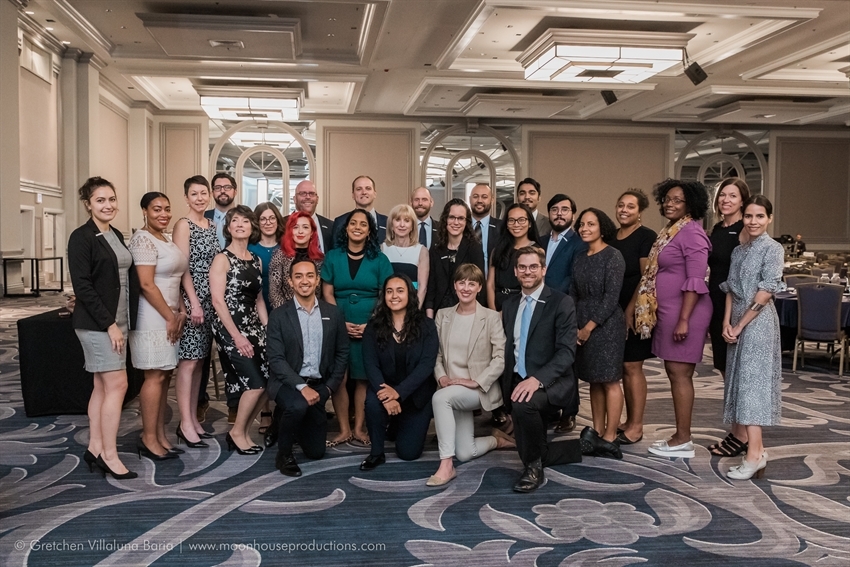
MPC staff
Racial disparities are visually apparent, not just in maps, but in real life too.
“You can drive 2-3 miles down the street in Chicago, and it’s like going from Alabama to Iowa in terms of rates of upward social mobility.” In other words, neighborhoods in Chicago vary wildly in terms of opportunity to escape poverty, even if those neighborhoods are right next to each other.
While these patterns of inequality are visible at the national level, “the origins of this phenomenon are incredibly local,” says Chetty. Oppression and systems of inequality manifest in large and small ways, which present important opportunities, both large and small.
On racial disparities in downward social mobility across generations
Chetty also shared research findings on disparities between white and Black men coming from higher-income families, and how rates of downward social mobility result in continuous patterns of inequality.
“Achieving the American Dream is like climbing an income ladder for white men. It’s more like being on a treadmill for Black men. Even after you climb up in one generation…you have a much higher chance of falling down in the income distribution than white men… as a result, there’s a persistence of racial disparities across generations.”
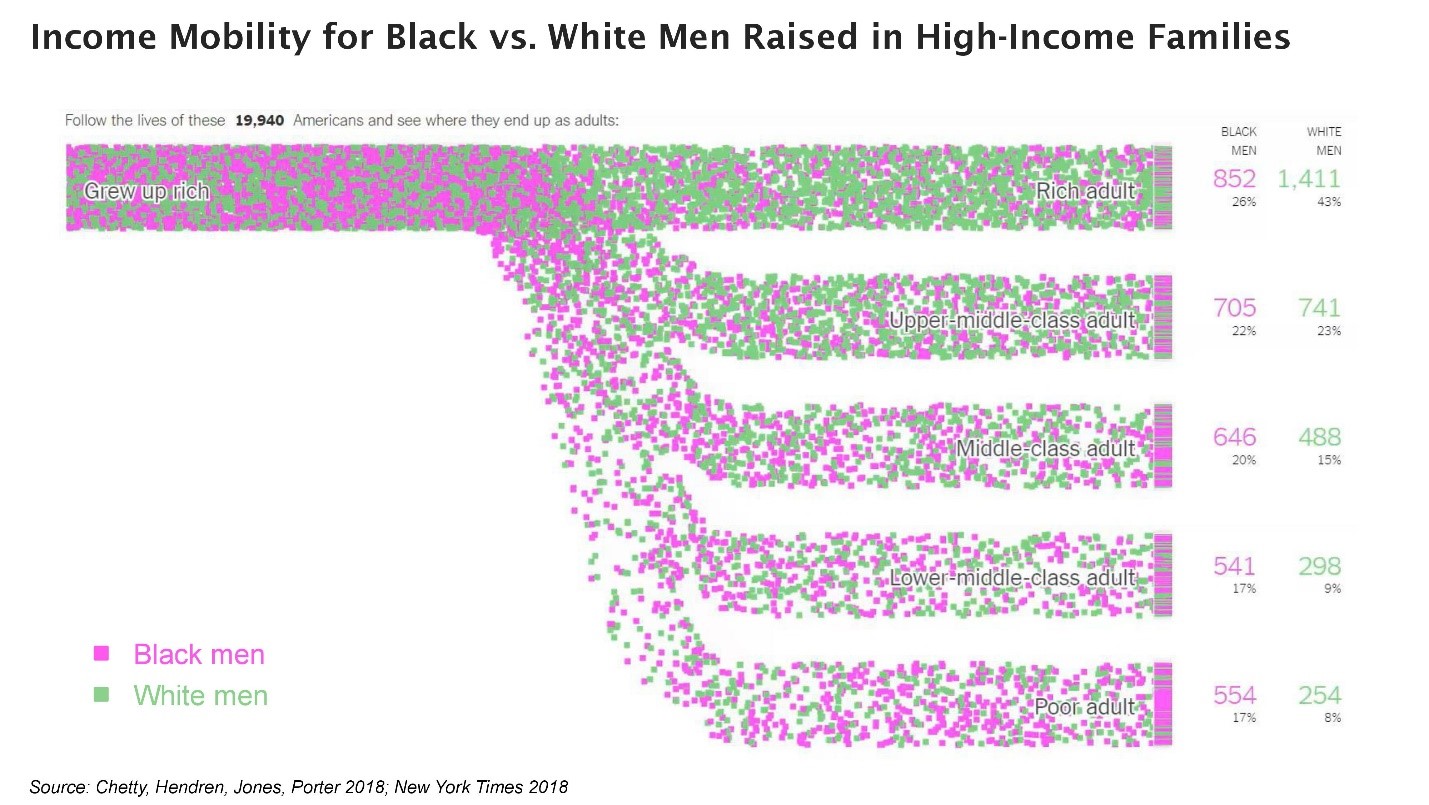
“What that implies is, when we’re thinking about how to solve racial disparities… I think it’s equally important to think about the upper-middle-class, so you can help Black families stay there, once they’ve made that climb.”
On policy solutions for Chicago
Informed by these findings, Chetty’s team at Opportunity Insights has developed three approaches to policy solutions: reducing segregation by moving low-income families to areas with better opportunities; place-based investments to boost upward mobility in low-opportunity neighborhoods; and improving quality and access to higher education to spur social mobility outcomes.
While these policy solutions have started to be implemented nationwide, including a Creating Moves To Opportunity program already being piloted Seattle, Chetty ended his presentation, as all star professors do- with a simple idea for his “students” to grapple with:
What is the recipe for success in Chicago?